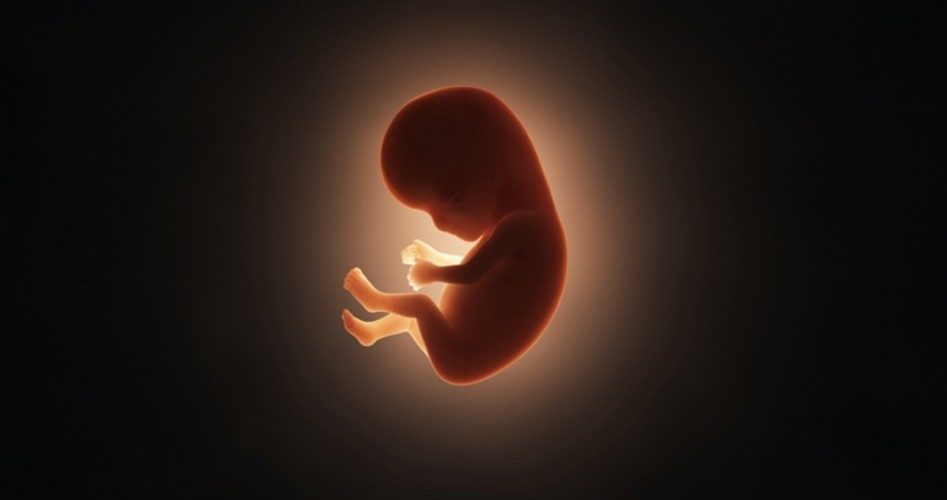
A new study in the Journal of Medical Ethics supports what many doctors have claimed for years: Unborn babies might experience pain much sooner than 24 weeks’ gestation.
Dr. Stuart WG Derbyshire and Dr. John C. Bockman, two researchers with “divergent views regarding the morality of abortion” are the authors behind the paper, “Reconsidering Foetal Pain,” which explores whether the science continues to support the previous understanding that a fetus cannot feel pain before 24 weeks.
“One of us believes that abortion is necessary for women’s health and autonomy, while the other believes that abortion violates the ethical principle of non-maleficence and ought to be restricted and discouraged,” they wrote. “Regardless of our stark differences on this question, we both believe that our moral views on abortion should not interfere with discussion of whether fetal pain is possible and whether the science of fetal development can rule out the possibility of fetal pain.”
“We believe that fetal pain does not have to be equivalent to a mature adult human experience to matter morally, and so fetal pain might be considered as part of a humane approach to abortion,” they added.
The study’s researchers note that the debate over fetal pain has focused on the cortex and intact thalamacortical tracts, which do not develop until after 24 weeks, but this study examined whether it is necessary for the cortex to be fully developed in order to experience pain.
The authors note that numerous papers have been published that suggested the relationship between the cortex and pain has been overstated. One such study showed pain experience in a patient who had extensive damage to the cortical regions believed to be necessary for pain. They also cite colleagues who speculated neural activity in the subplate, which occurs at around 12 weeks’ gestation, might support fetal pain experience.
“Even if the cortex is deemed necessary for pain experience,” they wrote, “there is now good evidence that thalamic projections into the subplate, which emerge around 12 weeks’ gestation, are functional and equivalent to thalamocortical projections that emerge around 24 weeks’ gestation.
The authors also examined the psychology behind pain, which is beyond sensory pain, but involves the conscious understanding of being in pain. And while conceding that fetuses might not have the psychological conscious experience that goes beyond cortical activity when it comes to pain, the authors propose “the fetus experiences a pain that just is and it is because it is, there is no further comprehension of the experience, only an immediate apprehension.” The researchers attribute this to the biological activity that emerges sometime after 12 weeks’ gestation.
The authors compared this finding to what others have argued in relation to an animals’ pain experience:
Our position is quite similar to that of others who have argued that animals might not feel pain at all or feel something that is direct and bodily and not connected to any reflection such that the animal might regard the sensation as unpleasant or, indeed, regard the sensation as anything at all. It can be argued that such a pain lacks moral relevance, but we view that position with some suspicion.
The scientists determined neuroscience could not definitely rule out pain before 24 weeks:
Overall, the evidence, and a balanced reading of that evidence, points towards an immediate and unreflective pain experience mediated by the developing function of the nervous system from as early as 12 weeks. That moment is not categorical, fetal development is continuous and not an event, and we recognise that some evidence points towards an immediate and unreflective pain not being possible until later. Nevertheless, we no longer view fetal pain (as a core, immediate, sensation) in a gestational window of 12-24 weeks as impossible based on the neuroscience.
According to the medical researchers behind the study, anyone who claims with certainty that a fetus does not feel pain “flirts with moral recklessness.”
The researchers call for further research on fetal pain, and though they fundamentally disagree on the ethical approach to abortion, agree based on their research that “it is reasonable to consider some form of fetal analgesia during later abortions” at the very least.
Pro-life lawmakers have been exploring legislation focused on fetal pain and not viability. Most of this legislation has set the ability to feel pain at 20 weeks as the limit, though scientists have long argued that fetal pain can be experienced sooner than that.
According to Dr. Maureen Condic, an associate professor of neurobiology and anatomy at the University of Utah who testified before Congress in 2013, fetuses can feel pain as early as eight weeks into the pregnancy.
“The neural circuitry responsible for the most primitive response to pain, the spinal reflex, is in place by 8 weeks of development,” she explained in her testimony. “This is the earliest point at which the fetus experiences pain in any capacity.”
Photo: BlackJack3D / iStock / Getty Images Plus

